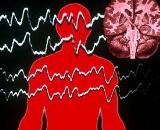A seizure is a transient event that is due to excessive or synchronous neuronal activity in the brain. Seizures may be provoked (by hypoglycemia or alcohol withdrawal, etc) or spontaneous (by underlying epilepsy). Signs and symptoms of seizures depend on the area of the brain that is the origin and may include loss of consciousness, confusion, visual or other sensory symptoms, body shaking, limb jerking, or a brief loss of awareness. Diagnosis of seizure is done by taking the patient's history, physical examination, EEG, and brain imaging. In the acute setting, seizures are initially treated with benzodiazepines (lorazepam or midazolam), followed by phenytoin or phenobarbital. Treatment with antiepileptic drugs (AEDs) may be required in some patients.

